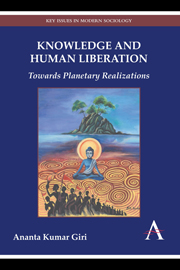Book contents
- Frontmatter
- Contents
- Preface
- Acknowledgments
- Foreword
- Introduction: The Calling of Transformative Knowledge
- Part I Nurturing the Garden of Transformational Knowledge: Roots and Variants
- 1 Knowledge and Human Liberation: Jürgen Habermas, Sri Aurobindo and Beyond
- 2 Beyond West and East: Co-evolution and the Calling of a New Enlightenment and Non-duality
- 3 The Modern Prince and the Modern Sage: Transforming Power and Freedom
- 4 Kant and Anthropology
- 5 Tocqueville as an Ethnographer of American Prison Systems and Democratic Practice
- Part II Rethinking Knowledge
- Part III Aspirations and Struggles for Liberation: Towards Planetary Realizations
- Afterword
- Advance Praise
1 - Knowledge and Human Liberation: Jürgen Habermas, Sri Aurobindo and Beyond
from Part I - Nurturing the Garden of Transformational Knowledge: Roots and Variants
Published online by Cambridge University Press: 05 May 2013
- Frontmatter
- Contents
- Preface
- Acknowledgments
- Foreword
- Introduction: The Calling of Transformative Knowledge
- Part I Nurturing the Garden of Transformational Knowledge: Roots and Variants
- 1 Knowledge and Human Liberation: Jürgen Habermas, Sri Aurobindo and Beyond
- 2 Beyond West and East: Co-evolution and the Calling of a New Enlightenment and Non-duality
- 3 The Modern Prince and the Modern Sage: Transforming Power and Freedom
- 4 Kant and Anthropology
- 5 Tocqueville as an Ethnographer of American Prison Systems and Democratic Practice
- Part II Rethinking Knowledge
- Part III Aspirations and Struggles for Liberation: Towards Planetary Realizations
- Afterword
- Advance Praise
Summary
An Adventure and an Invitation
Human liberation has been a key concern with humanity from the dawn of history, and in the contemporary moment, it manifests before us as an epochal challenge, as the prevalent guarantors of liberation in modernity – liberalism and socialism – have left us alone in the street. The dead end at which our familiar projects of social emancipation and human freedom are at present urges us to rethink liberation as part of a new seeking, striving, and experimental subjectivity at the level of both self and society. Human liberation means liberation from the oppressive structures of society as well as from one's ego and urge to control (which is one of the most important sources of social evils, as Teressa Brennan (1995) would tell us). It also means to relate positively and affirmatively to new schemes of being and becoming and to create alternative spaces of self-realization, intersubjectivity and solidarity. In this practice and quest of human liberation, knowledge plays an important role, and Jürgen Habermas and Sri Aurobindo, two soul-touching thinkers of our time, help us to understand the multi-dimensional pathways of linkages between knowledge, human interest and human liberation. Their pathways of seeking and striving touch us not only as cognitive schemes but as intimations of a Beyond. Though Habermas is conventionally looked at as approaching knowledge only through rational argumentation, there is a suggestion of a Beyond in him. It is no wonder then that in many of his works, as for example in Between Facts and Norms: Towards a Discourse Theory of Law and Democracy, Habermas (1996) talks of the need to proceed with “weak transcendental idealizations” in our practices of communication and the acquisition of knowledge (also see Habermas 2002a).
- Type
- Chapter
- Information
- Knowledge and Human LiberationTowards Planetary Realizations, pp. 33 - 50Publisher: Anthem PressPrint publication year: 2013



